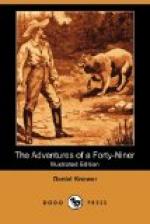It was evening. We stopped at a hotel, and I slept in my Mackinaw blanket that I carried with me, on the dining-room floor. The next morning after breakfast, about 9 o’clock, I went out on the front portico to take observations of the place. The landlord was there. There was a loaferish-looking fellow going by on the opposite side of the street. The landlord cries out to him: “Bill, what will you charge to chop wood for me from now until night?” He cries back, “What will you give?” He replies, “$10.” Bill answers back, “Can’t chop for less than an ounce,” which was $16, and walked right on. It was evident that common labor was not suffering there for want of employment. I was there some days, and could find no one to post me how to get to Coloma. All was excitement and bustle. While there, Sam. Brannan—who had built a new hotel there (just finished), called the City Hotel—gave a free entertainment for one day to the public. He must have expended $1,000 for refreshments. He had been a Mormon preacher, and was a captain in Colonel Stevenson’s regiment. He was very enterprising and generous, a prominent figure with the “Forty-niners.”
I saw an article in the paper a few years ago from a California correspondent, giving a biography of him; that he was, at one time, worth several millions, and went into some big enterprise—which I cannot now recall—and was unfortunate and lost all his wealth, and that he was, at that time, in San Francisco at a twenty-five-cent lodging-house, and that he told him that he passed two men that day who had crossed the street to avoid him, to whom he had furnished the money from which they had made their fortunes. Well, I finally found an Oregon man with a yoke of oxen, who was freighting goods up to Coloma. He said he had seven hundred and fifty acres of land in Oregon, but no cattle on it. He thought he would come to California and get gold enough to buy them, and his wife was keeping a cake and pie stand on the streets of that city. I never saw him after that trip, but coming with so modest expectations, I have no doubt he was successful.
We started on our journey in the afternoon. The country through which we traveled looked as if it had been an old-settled land, and deserted by its inhabitants. It seemed that we must come to a farm-house, but there was none. There were scattering trees in the country and occasionally a woods, but no dense forest. We made eight miles, then camped for the night on the edge of a woods. I had brought no provisions with me, so I offered him $1 per meal to eat with him, which was accepted. He made tea, cooked some Indian meal, and had a jug of molasses; so we made a very good supper. I got my satchel out of the wagon for a pillow, and with my blankets made my bed on the ground under the wagon. I thought it would keep the dew off, but there was none.




